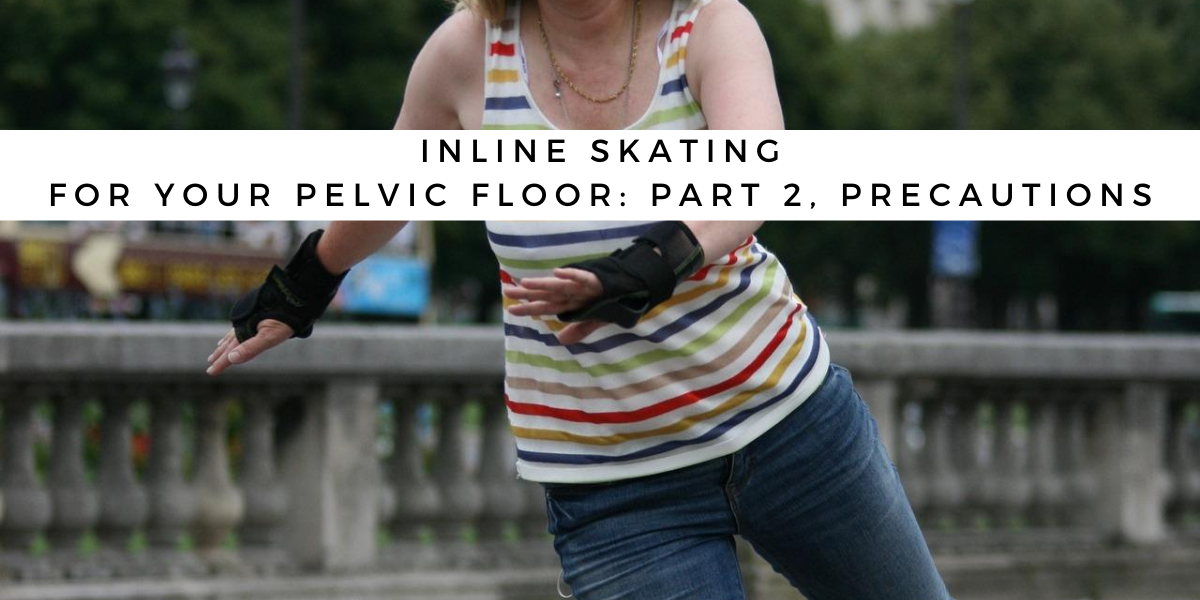Skating can be brilliant exercise for your pelvic floor for so many reasons, which you can read about in Part 1 of this blog post.
BUT! (There is always a but!) Inline skating (or “rollerblading”) can be a good choice for assisting your pelvic floor rehab, BUT ideally under these three conditions…
You have skated before.
This one’s important. If you already have the “feel” of skating, you can focus on activation of your pelvic floor and deep abdominal muscles throughout, as your physio has hopefully taught you. This is because you’ll already have a certain amount of balance. This is probably even the case if you skated as a kid but haven’t tried for years – your nervous system will have a certain amount of skating memory! (This is sometimes known as “muscle memory”, but has a lot more to do with your nervous system function than your muscles themselves.)
On the other hand, if you’ve never skated before, you will feel all over the place when you put them on. You’ll need to concentrate very hard on the techniques that your skate teacher or companion is teaching you. You won’t have enough brain space to focus fully on the pelvic floor the whole time. Because of this, skating could actually provoke your symptoms. If you overbalance, the sudden movement might cause you to leak urine. If you’re not coordinating your muscles smoothly because you’re a beginner, there will be increased pressure on your pelvic floor, which can worsen prolapse symptoms. And if you (heaven forbid) fall on your backside, being sore and sorry can either inhibit your pelvic floor (leading to more symptoms) or give you pelvic floor spasm, which plain old hurts!
So skating is a pelvic floor-friendly activity for people with a certain level of skill and can be returned to safely if you have no pelvic floor symptoms. But if you have prolapse or incontinence, you will need to do some pelvic floor rehab first and then make sure you use these muscles while skating. And if you have no experience skating – learn from a teacher!
You can actively contract your pelvic floor muscles correctly.
Many people think they are contracting their pelvic floor when they are actually using different muscles of the buttocks or abdomen. Some people are even pushing down when they feel like they’re pulling up with these muscles. Especially if you have leakage or prolapse, it’s important to get your pelvic floor technique checked by a physiotherapist who specializes in this area first. If you are doing it wrong, then even a relatively low-impact exercise like inline skating can increase your symptoms.
You don’t have problems with an overactive pelvic floor.
Urine leakage and prolapse aren’t the only two problems you can have with your pelvic floor. Symptoms like painful sex and pelvic pain, and conditions like vaginismus, coccydynia and endometriosis, are linked with an overactive pelvic floor. If you learn the correct skating technique, you’ll limit your falls – but falls do still happen. A hard fall on the buttocks, sitting bones or tailbones can increase the tension in the pelvic floor muscles or even make them go into spasm. This is painful in itself, but also aggravates the overactive pelvic floor conditions I listed. If you have symptoms of an overactive pelvic floor, I strongly recommend you have this treated by a pelvic floor physio before you return to (or take up) inline skating or “rollerblading”.
Inline skating is one of the best forms of exercise around: it’s great for strong glutes and a good core, terrific for your balance and fitness, and can be a whole body workout. And did I mention FUN? Don’t let your pelvic floor hold you back: by having it assessed and treated by a pelvic floor physio, you can then safely get into skating, which will then improve it even more! Make sure you see a physio with special training in pelvic floor and can do a full assessment. If you live near or can get to Brisbane (Australia), I would be happy to help you.
Happy skating!

